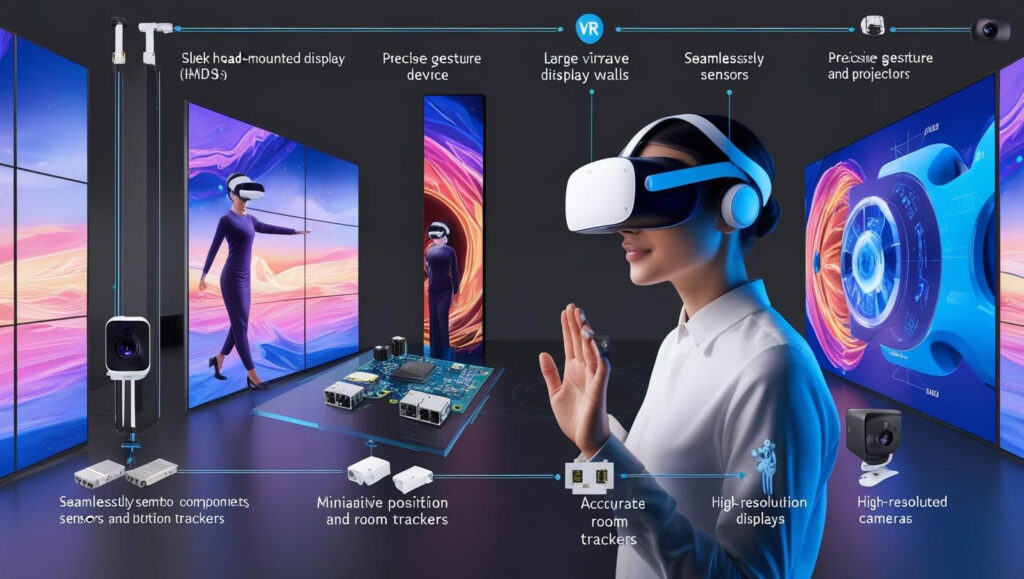Virtual reality (VR) has evolved from a niche concept to a transformative force reshaping industries and redefining how people interact with digital environments. The immersive VR market is at the forefront of this evolution, offering groundbreaking solutions that enhance user engagement, improve productivity, and revolutionize experiences across sectors such as gaming, healthcare, education, and beyond.
Download PDF Brochure @ https://www.marketsandmarkets.com/pdfdownloadNew.asp?id=201528031

A Surge in Demand for Immersive Experiences
The growing adoption of immersive VR is fueled by advancements in hardware and software technologies. Today’s VR systems offer high-definition visuals, responsive motion tracking, and realistic interactions, creating an unmatched sense of immersion. From fully immersive gaming environments to virtual classrooms that replicate real-world conditions, VR is no longer just a futuristic idea; it’s becoming a staple of modern life.
According to market reports, the global immersive VR market is poised to grow significantly, driven by increasing demand in sectors like entertainment, education, healthcare, and retail. With consumers craving hyper-realistic experiences and businesses recognizing the potential of VR to improve training, collaboration, and customer engagement, the market’s trajectory points toward a bright future.
Key Drivers of Growth in the Immersive VR Market
- Advancements in Technology
Continuous innovation in VR hardware—such as lightweight headsets, higher-resolution displays, and improved motion tracking—is enabling more comfortable and accessible user experiences. Software advancements, including AI-driven interactivity and real-time rendering, further enhance the realism of VR environments. - Growing Applications Across Industries
- Gaming and Entertainment: Gaming remains a dominant segment for VR adoption. Immersive VR allows gamers to step into fantastical worlds, offering interactive experiences that were once unimaginable. Entertainment venues are also leveraging VR to create theme park-style attractions and live virtual events.
- Healthcare: From VR-assisted surgeries to mental health therapy, healthcare professionals are using immersive VR to train, treat, and enhance patient care. For example, VR simulations are providing medical students with hands-on experience in a safe, controlled environment.
- Education and Training: Educational institutions and businesses alike are incorporating VR into their training programs. VR offers learners a hands-on approach, whether it’s training pilots in virtual cockpits or teaching students through virtual field trips to historical landmarks.
- Investment and Innovation by Key Players
Tech giants like Meta (formerly Facebook), HTC, Sony, and Microsoft are heavily investing in VR development, driving competition and fostering innovation. These companies are focusing on creating VR solutions that cater to both consumer and enterprise markets. - Increased Accessibility
The decreasing costs of VR hardware and the introduction of standalone VR devices have made immersive VR accessible to a broader audience. The entry of affordable options without compromising quality has encouraged widespread adoption.
Challenges and Opportunities
While the immersive VR market holds immense potential, challenges such as high initial costs for advanced systems, limited content variety, and motion sickness concerns remain. However, ongoing research and development are expected to address these issues.
Opportunities abound in untapped markets such as retail, where VR can enhance customer experiences through virtual shopping and product customization. The rise of the metaverse also presents an exciting avenue for VR growth, with companies creating fully immersive digital ecosystems.
Future Outlook
The immersive VR market is poised to become an integral part of daily life, transforming how people work, play, and learn. As technology continues to advance, VR will become more intuitive, accessible, and impactful. Industries that embrace immersive VR today will not only stay competitive but also lead the way in delivering next-generation experiences.
The immersive VR market is revolutionizing the way we experience and interact with the world. By offering unparalleled levels of engagement and realism, VR has the power to transform industries and redefine the possibilities of digital experiences. As adoption grows, the market is set to flourish, paving the way for a future where virtual and physical realities seamlessly converge.